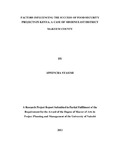| dc.description.abstract | Food insecurity persists in Mbooni East Sub County as over 60% of the population in the Sub County rely on relief food distribution every drought year.
Despite significant food security projects initiatives in the Sub County, food
insecurity and extreme rural poverty has continued to pose major socio-economic
problems to many households in the Sub County. The transition rate of food poor
households to self-reliance of food supplies has largely remained inadequate. Many of
the beneficiaries of the state sponsored food security project interventions have
frequently failed to put in place measures for self reliance once the sponsored project
interventions get to an end and therefore food security has remained elusive. This
study was carried out purposed to assess the factors which influence food security
projects success in the Sub County. The specific objectives of the study were to:
establish the extent to which institutional capacity factors influence the success of
food security projects in Mbooni East Sub County; assess the extent to which project
operation influence the success of food security projects in Mbooni East Sub County
and to investigate the extent to which technological input influence the success of
food security projects in Mbooni East Sub County. The research was conducted in
Mbooni East Sub County in Makueni County, Kenya. It mainly targeted all the food
security project initiatives implemented in the Sub County, the farmer committee
members and officers who implement these projects as its target population. The
study adopted a descriptive survey design and studied all the nine food security
initiative projects implemented in the Sub County. Respondents were 128, consisting
of 64 committee members of the projects, 12 Ministry of Agriculture staff and 52
Chiefs and their assistants. The committee members were farmers elected by
beneficiaries who were seven per project and one overall stakeholder chairman. Data
was collected using questionnaires, interview schedules, observations and document
analysis checklists. The collected data was analyzed using descriptive statistics,
content analysis, and regression. The Statistical Package for Social Sciences (SPSS
version 20) Computer Application Package tool was used. The findings showed that
institutional capacity factors investigated, the projects' operations strategies used to
implement the projects and technological inputs earmarked for these projects
influenced their success but they are applied to low extents in the Sub County. The
findings revealed that the factors investigated (institutional capacity, project operation
strategies and technological inputs) accounted for 42.1% variability in food security
projects success in the Sub County while the remaining percentage was due to other
factors. The study concluded that the projects are not delivering what they are
supposed to, do not get results, and do not meet stakeholders' expectations. They
were found to be failing due to low extent application of desired institutional capacity
factors, low extent applications of 'designed success strategies and very low
application of targeted technological inputs meant to drive these projects to success.
The study therefore, recommended all inclusive trainings on leadership and
management, enhanced operation strategies where input subsidies provisions and
adequate resource allocations are given priority. It also recommended sustainable
technological inputs like water harvesting fur irrigation and locally adapted drought
tolerant seed varieties use to be given emphasis. | en |

